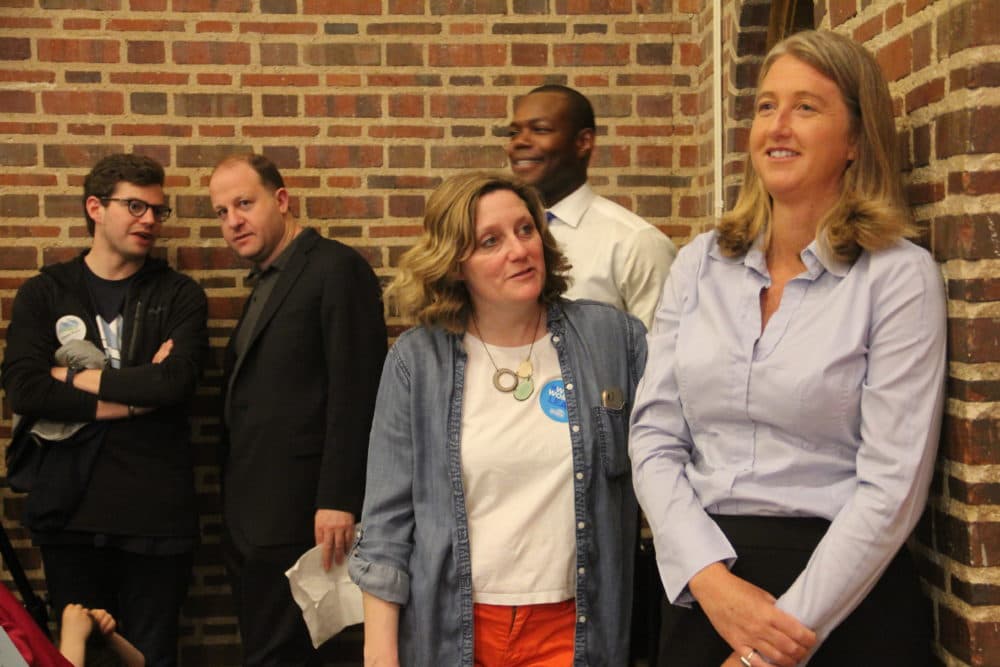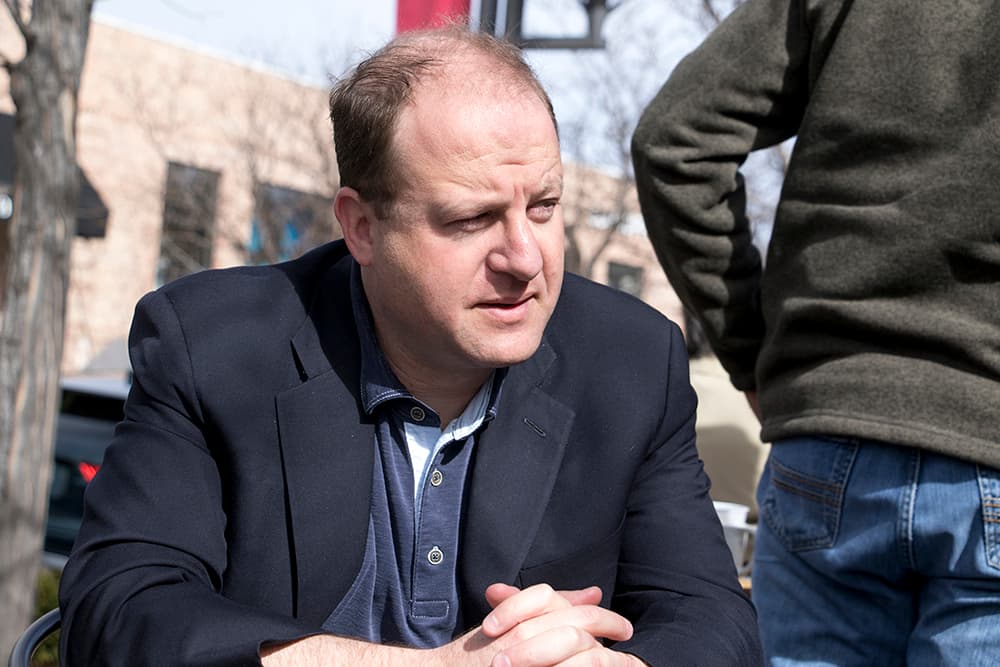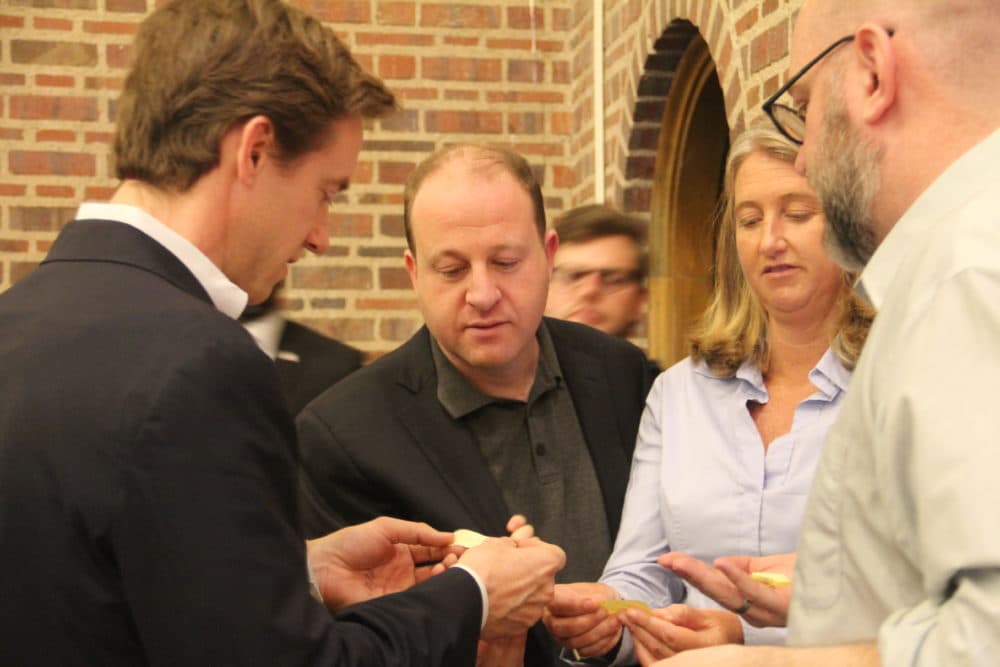
One of the most talked-about storylines in Democratic circles could culminate on Saturday when the Democratic State Assembly meets at the 1stBank Center in Broomfield.
Former State Treasurer Cary Kennedy has been on a run since winning the preference poll during precinct caucuses last month. She’s closing in on U.S. Rep. Jared Polis, long considered the party favorite since he announced his candidacy, as the party’s frontrunner. She will need to prove that March’s results weren’t a fluke on Saturday and match the support she earned last month.
If you're following the race for governor, you'll want to follow that story and a few other key parts of this Saturday's proceedings.
There will be 3,814 delegates at the Dems' state assembly, according to a release from Colorado Democrats. While gubernatorial candidates will get the brightest spotlight, voters will also decide on candidates for attorney general, treasurer, secretary of state and a CU regent-at-large.
"Democrats across Colorado are fired up for the 2018 elections, and we have a bumper crop of candidates running on the Democratic side this year," Colorado Democratic Party Chair Morgan Carroll said in the release. "This is an all-hands-on-deck moment for our state and our country, and the state assembly is a key opportunity for Democrats to organize for victory in November."
Unlike the Republican assembly, where things can and have been known to get weird, the Democrats' assembly won’t likely have a ton of surprises.
Only three gubernatorial candidates are participating in the assembly: Kennedy, Polis and Erik Underwood. Polis, Lt. Gov. Donna Lynne and Mike Johnston submitted petitions to appear on the ballot (Johnston has already qualified, while Lynne’s and Polis’ signatures are still being processed). Polis is the only candidate participating in both processes.
After candidates speak, delegates will vote. Democratic bigwigs like Gov. John Hickenlooper, House Speaker Crisanta Duran and Senate Minority Leader Leroy Garcia will also be on hand to speak.
Gubernatorial results should roll in by afternoon.
Colorado Democratic Party spokesman Eric Walker said the assembly’s call to order is at 10 a.m., though delegates will start checking in at 8 a.m. After it starts, party members will give some speeches. Then it’s showtime: The candidates are introduced and are given speaking time.
Walker said gubernatorial candidates will get seven minutes to speak, while the remaining candidates will get five. After everyone speaks, each delegate submits their ballot to the state party’s staff; their ballots include options for all the offices and candidates. Democrats will be casting their votes on paper ballots (the Republicans use clickers, remember), so it could take some time after all are submitted before a final tally is available. Walker said it'll likely be completed by the afternoon.
The press will be notified as soon as the results are announced on the assembly floor. Walker said these results will be pending Secretary of State approval.
Walker said this year's assembly will include a very energetic fanbase, due mostly to Democrats being "upset" over what's happening in Washington — the Trump effect.
"Folks are pretty fired up on our side," Walker said.
He's not kidding: March's caucuses had among the highest turnout in years. Walker said this year's caucus turnout was greater than in 2010, when U.S. Sen. Michael Bennet and Andrew Romanoff competed in a hotly-contested Democratic primary.
If Kennedy wins, how big will the margin be?
Kennedy — who has committed to the assembly process to qualify for the primary — is the only high-profile candidate seeking to qualify exclusively through the assembly on the Democratic side.
She will need to earn 30 percent of delegates for a place in the primary (last time I mention this, I promise). Her campaign will surely expect similar results to those she witnessed in several county assemblies, including some of the state’s largest. She’s earned 60 percent or more of delegate support in Denver, Jefferson, Weld, Douglas and Arapahoe counties, according to her campaign.
“The caucus and assembly process has helped me expand my statewide, grassroots campaign,” Kennedy said in a statement. “I have been humbled by the level of support I have received at county assemblies across the state and I am looking forward to taking this momentum to the state assembly and to the primary in June.”
By her campaign’s count, Kennedy has won more than 2,000 delegates at county assemblies -- which would be more than half of all delegates scheduled to attend Saturday. She won 481 delegates from Denver County, compared to 168 for Polis. Her campaign numbers also show she bested Polis in his home county of Boulder, earning 214 to Polis 168.
Jared Polis has been the frontrunner from the start but Kennedy has just about caught up. Can he reclaim his demanding lead?
Polis is the only Democratic candidate trying the two ways to gain access to the ballot. While he’s still waiting for signatures he submitted in March to be verified by the Secretary of State’s office, he will need to make sure he gets at least 10 percent of delegates at the state level.
“I’m confident we will be on the ballot,” Polis said last week.

Polis seems confident about Saturday’s assembly. But the stakes are high: Fail to earn 10 percent and his quest is over.
“We’ve got about 33 percent (support from delegates), so that’s good,” Polis said.
That’s more than enough, but as Polis jokingly noted, that only works if those delegates show up.
“At this point, they’re all pledged delegates, so if our people show up, we’ll be at just slightly over 30 percent,” Polis said. “I knew I was never the candidate of party insiders. Because I always try to tackle things a little differently and I try to bring in new ideas and I challenge the Democratic party status quo, I’ve never been the favorite of the lobbyist or the party insiders.”
By contrast, Johnston, who had been exploring a similar strategy, last week opted out. His campaign told the Colorado Independent they would not be participating in the state assembly. This might have had something to do with his overall showing during a precinct caucus gubernatorial preference poll last month, where he received less than 10 percent of votes.
Walker said delegates are not bound by the votes they cast during the caucus or county assemblies. It's uncommon for delegates to switch after voting for a candidate at an assembly, but it's possible. This will allow delegates who had previously voted for Johnston, for example, to vote for someone who's still participating in the assembly.
So will there be any surprises in Broomfield?
There’s one way someone could shake things up at the Democratic assembly. It’s extremely rare and unlikely to happen, but we’re going to tell you about it anyway.
So remember how we told you Republican delegates can nominate someone from the floor at their assembly? This means any delegate can nominate a person on the spot and they’re in contention to compete with other candidates, including ones who have been working the party's scene for months.
Democrats have a similar option, but it’s a lot trickier to get in.
Walker said in order for a candidate to be nominated on the floor, there has to be a motion on the floor to suspend rules. Specifically, the delegates present must agree to suspend a rule requiring candidates to notify the party of their intention to participate in the assembly 10 days before it happens. This gives them adequate time to print ballots, Walker said.
So if someone wants to be nominated, a motion on the floor to suspend the rules is made. But a majority of those in attendance — and remember, there could be as many as 3,800 delegates present — is needed for the motion to pass, which would then allow a candidate nominated on the floor to participate and be in contention for the office they're nominated to. The votes are taken by ayes and nays.
Want to attend?
Attending as a guest is free but limited, according to Colorado Democrats spokesperson Eric Walker. He said there’s a limit due to venue capacity. You’ll have to show up in person and try to snatch up a spot, but only if there are spots available. The 1stBank Center is located at 11450 Broomfield St., in Broomfield.













